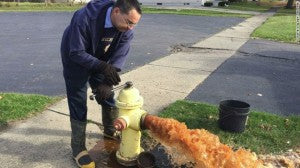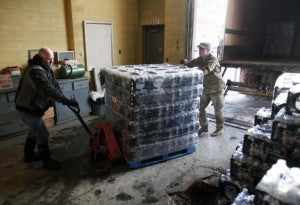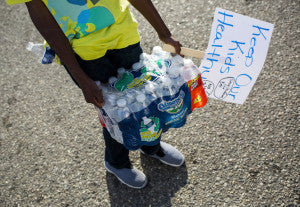[caption id="attachment_19879" align="alignright" width="300"]

Flint's water problem is less than healthy... - via CNN[/caption]
Flint, Mich. is in crisis. Its 99,000 citizens haven’t had safe tap water for almost two years because of high concentrations of lead, and it could be months more before their water is safe.
The National Guard has deployed soldiers to help pass out water, water filters and filter cartridges, and lead testing kits, and volunteers are going door to door with water.
The state’s chief medical executive said every child in the city under six years old, an estimated 8,657,
should be considered exposed to lead and get tested. Experts say
lead poisoning most affects children and has a lifelong impact, leading to lower IQ, learning disabilities, speech and language problems and a higher risk for behavioral problems.
In short, this crisis could continue for a long time and cost millions – even billions – of dollars.
And, yes, it could happen to you.
It didn’t have to happen. In 2014,
a state-appointed city manager decided to change the city’s water supply to save about $9.2 million per year. Flint had been getting water from Lake Huron, but in April 2014 it switched to water from the Flint River while waiting to connect to a new regional water system (The new system isn’t ready yet). The river water corroded the city’s old pipes and leached their metals, including lead, into the water. Residents immediately complained about the change and a General Motors engine plant stopped using the water, saying it rusted parts. However,
officials said the water was in compliance for safety.
In September 2015, a group of doctors found a spike in lead levels in the blood of children and recommended Flint residents
stop using city water for drinking and cooking. In mid-October, the state agreed to switch Flint’s water back to the previous system. But the pipes were already corroded, so the danger remained. On January 5,
the governor declared a state of emergency and asked for federal help for the city. On January 16,
President Obama declared it a federal emergency.
[caption id="attachment_19880" align="alignright" width="300"]

A volunteer helps unload water from a truck - via Independent[/caption]
The city had started passing out free water to residents. However, as of January 14, distribution was
limited to a case per family, or about 3 gallons. FEMA recommends a disaster supply kit contain a gallon of water per person per day, so if a family has more than three people,
they need alternate water sources. Many people and organizations are donating water. A list of ways to help is at the bottom.
The mayor says
the city’s pipes may need replacing, at a cost of up to $1.5 billion. But frankly, aging water infrastructure is a problem throughout the U.S.
The American Society for Civil Engineers (ASCE) in a 2013 report
gave the U.S. a D+ grade for its drinking water infrastructure. Some water pipes are
100 years old. Some are
made of wood. Many, even some installed in the 1980s,
contain lead. The ASCE report said there are an estimated 240,000 water main breaks per year in the U.S. The Environmental Protection Agency estimated it would cost $334.8 billion over 20 years to replace the old infrastructure. ASCE put the cost closer to $1 trillion. And frankly, water distributors don’t have the money. In 2010, Austin Water lost $53 million compared to its budget forecast,
according to Circle of Blue, a water news service.
The most expensive water bills are usually in places where infrastructure is being improved or water treatment equipment is being installed.
[caption id="attachment_19882" align="alignright" width="300"]

People of Flint have to rely on bottled water - via Flint Journal[/caption]
Even functioning water systems have problems. Last August, algae blooms in Lake Erie poisoned the water supply for Toledo,
causing hundreds of thousands of people to rely on bottled water for about a week.
Individuals can help.
The Environmental Protection Agency has steps people can take to protect watersheds. They include properly disposing hazardous material like motor oil and pesticides, volunteering for a watershed cleanup, and posting signs and stenciling storm drains with “No Dumping” reminders.
Emergency Essentials sells many types of
water filters. If lead is a concern, make sure that any filter is NSF certified for lead removal.
How to help residents of Flint, from USA Today
A fund has been established to address the short- and long-term needs of Flint children exposed to lead through contaminated drinking water. Donations can be made at
www.flintkids.com.
Holy Trinity Lutheran Church, 39020 Five Mile in Livonia, is asking for gallon jugs of water to be dropped off at the church by Jan. 30. Volunteers will take the donations to be distributed in Flint. Call 734-464-0211.
Flint Community Schools is accepting cash donations and bottled water.
Call the district's finance office at 810-767-6030 about cash donations. Bottled water drop-offs can be coordinated by calling 810-760-1310.
Donations are being accepted by the United Way of Genesee Count: Visit
unitedwaygenesee.org and click on the "GIVE" button. There's an option to support the Flint Water Project. Call 810-232-8121 for details. A new phase for outreach is investment in services to help residents who have been exposed to contaminated water.
Catholic Charities of Genesee County accepts cash or bottled water donations to aid soup kitchens and warming centers, call 810-785-6911.
To help Flint community activists who are delivering water: Call Melissa Mays at 810-423-3435.

 Flint's water problem is less than healthy... - via CNN[/caption]
Flint, Mich. is in crisis. Its 99,000 citizens haven’t had safe tap water for almost two years because of high concentrations of lead, and it could be months more before their water is safe. The National Guard has deployed soldiers to help pass out water, water filters and filter cartridges, and lead testing kits, and volunteers are going door to door with water.
The state’s chief medical executive said every child in the city under six years old, an estimated 8,657, should be considered exposed to lead and get tested. Experts say lead poisoning most affects children and has a lifelong impact, leading to lower IQ, learning disabilities, speech and language problems and a higher risk for behavioral problems.
In short, this crisis could continue for a long time and cost millions – even billions – of dollars.
And, yes, it could happen to you.
It didn’t have to happen. In 2014, a state-appointed city manager decided to change the city’s water supply to save about $9.2 million per year. Flint had been getting water from Lake Huron, but in April 2014 it switched to water from the Flint River while waiting to connect to a new regional water system (The new system isn’t ready yet). The river water corroded the city’s old pipes and leached their metals, including lead, into the water. Residents immediately complained about the change and a General Motors engine plant stopped using the water, saying it rusted parts. However, officials said the water was in compliance for safety.
In September 2015, a group of doctors found a spike in lead levels in the blood of children and recommended Flint residents stop using city water for drinking and cooking. In mid-October, the state agreed to switch Flint’s water back to the previous system. But the pipes were already corroded, so the danger remained. On January 5, the governor declared a state of emergency and asked for federal help for the city. On January 16, President Obama declared it a federal emergency.
[caption id="attachment_19880" align="alignright" width="300"]
Flint's water problem is less than healthy... - via CNN[/caption]
Flint, Mich. is in crisis. Its 99,000 citizens haven’t had safe tap water for almost two years because of high concentrations of lead, and it could be months more before their water is safe. The National Guard has deployed soldiers to help pass out water, water filters and filter cartridges, and lead testing kits, and volunteers are going door to door with water.
The state’s chief medical executive said every child in the city under six years old, an estimated 8,657, should be considered exposed to lead and get tested. Experts say lead poisoning most affects children and has a lifelong impact, leading to lower IQ, learning disabilities, speech and language problems and a higher risk for behavioral problems.
In short, this crisis could continue for a long time and cost millions – even billions – of dollars.
And, yes, it could happen to you.
It didn’t have to happen. In 2014, a state-appointed city manager decided to change the city’s water supply to save about $9.2 million per year. Flint had been getting water from Lake Huron, but in April 2014 it switched to water from the Flint River while waiting to connect to a new regional water system (The new system isn’t ready yet). The river water corroded the city’s old pipes and leached their metals, including lead, into the water. Residents immediately complained about the change and a General Motors engine plant stopped using the water, saying it rusted parts. However, officials said the water was in compliance for safety.
In September 2015, a group of doctors found a spike in lead levels in the blood of children and recommended Flint residents stop using city water for drinking and cooking. In mid-October, the state agreed to switch Flint’s water back to the previous system. But the pipes were already corroded, so the danger remained. On January 5, the governor declared a state of emergency and asked for federal help for the city. On January 16, President Obama declared it a federal emergency.
[caption id="attachment_19880" align="alignright" width="300"] A volunteer helps unload water from a truck - via Independent[/caption]
The city had started passing out free water to residents. However, as of January 14, distribution was limited to a case per family, or about 3 gallons. FEMA recommends a disaster supply kit contain a gallon of water per person per day, so if a family has more than three people, they need alternate water sources. Many people and organizations are donating water. A list of ways to help is at the bottom.
The mayor says the city’s pipes may need replacing, at a cost of up to $1.5 billion. But frankly, aging water infrastructure is a problem throughout the U.S.
The American Society for Civil Engineers (ASCE) in a 2013 report gave the U.S. a D+ grade for its drinking water infrastructure. Some water pipes are 100 years old. Some are made of wood. Many, even some installed in the 1980s, contain lead. The ASCE report said there are an estimated 240,000 water main breaks per year in the U.S. The Environmental Protection Agency estimated it would cost $334.8 billion over 20 years to replace the old infrastructure. ASCE put the cost closer to $1 trillion. And frankly, water distributors don’t have the money. In 2010, Austin Water lost $53 million compared to its budget forecast, according to Circle of Blue, a water news service. The most expensive water bills are usually in places where infrastructure is being improved or water treatment equipment is being installed.
[caption id="attachment_19882" align="alignright" width="300"]
A volunteer helps unload water from a truck - via Independent[/caption]
The city had started passing out free water to residents. However, as of January 14, distribution was limited to a case per family, or about 3 gallons. FEMA recommends a disaster supply kit contain a gallon of water per person per day, so if a family has more than three people, they need alternate water sources. Many people and organizations are donating water. A list of ways to help is at the bottom.
The mayor says the city’s pipes may need replacing, at a cost of up to $1.5 billion. But frankly, aging water infrastructure is a problem throughout the U.S.
The American Society for Civil Engineers (ASCE) in a 2013 report gave the U.S. a D+ grade for its drinking water infrastructure. Some water pipes are 100 years old. Some are made of wood. Many, even some installed in the 1980s, contain lead. The ASCE report said there are an estimated 240,000 water main breaks per year in the U.S. The Environmental Protection Agency estimated it would cost $334.8 billion over 20 years to replace the old infrastructure. ASCE put the cost closer to $1 trillion. And frankly, water distributors don’t have the money. In 2010, Austin Water lost $53 million compared to its budget forecast, according to Circle of Blue, a water news service. The most expensive water bills are usually in places where infrastructure is being improved or water treatment equipment is being installed.
[caption id="attachment_19882" align="alignright" width="300"] People of Flint have to rely on bottled water - via Flint Journal[/caption]
Even functioning water systems have problems. Last August, algae blooms in Lake Erie poisoned the water supply for Toledo, causing hundreds of thousands of people to rely on bottled water for about a week.
Individuals can help. The Environmental Protection Agency has steps people can take to protect watersheds. They include properly disposing hazardous material like motor oil and pesticides, volunteering for a watershed cleanup, and posting signs and stenciling storm drains with “No Dumping” reminders.
Emergency Essentials sells many types of water filters. If lead is a concern, make sure that any filter is NSF certified for lead removal.
How to help residents of Flint, from USA Today
A fund has been established to address the short- and long-term needs of Flint children exposed to lead through contaminated drinking water. Donations can be made at www.flintkids.com.
Holy Trinity Lutheran Church, 39020 Five Mile in Livonia, is asking for gallon jugs of water to be dropped off at the church by Jan. 30. Volunteers will take the donations to be distributed in Flint. Call 734-464-0211.
Flint Community Schools is accepting cash donations and bottled water. Call the district's finance office at 810-767-6030 about cash donations. Bottled water drop-offs can be coordinated by calling 810-760-1310.
Donations are being accepted by the United Way of Genesee Count: Visit unitedwaygenesee.org and click on the "GIVE" button. There's an option to support the Flint Water Project. Call 810-232-8121 for details. A new phase for outreach is investment in services to help residents who have been exposed to contaminated water.
Catholic Charities of Genesee County accepts cash or bottled water donations to aid soup kitchens and warming centers, call 810-785-6911.
To help Flint community activists who are delivering water: Call Melissa Mays at 810-423-3435.
People of Flint have to rely on bottled water - via Flint Journal[/caption]
Even functioning water systems have problems. Last August, algae blooms in Lake Erie poisoned the water supply for Toledo, causing hundreds of thousands of people to rely on bottled water for about a week.
Individuals can help. The Environmental Protection Agency has steps people can take to protect watersheds. They include properly disposing hazardous material like motor oil and pesticides, volunteering for a watershed cleanup, and posting signs and stenciling storm drains with “No Dumping” reminders.
Emergency Essentials sells many types of water filters. If lead is a concern, make sure that any filter is NSF certified for lead removal.
How to help residents of Flint, from USA Today
A fund has been established to address the short- and long-term needs of Flint children exposed to lead through contaminated drinking water. Donations can be made at www.flintkids.com.
Holy Trinity Lutheran Church, 39020 Five Mile in Livonia, is asking for gallon jugs of water to be dropped off at the church by Jan. 30. Volunteers will take the donations to be distributed in Flint. Call 734-464-0211.
Flint Community Schools is accepting cash donations and bottled water. Call the district's finance office at 810-767-6030 about cash donations. Bottled water drop-offs can be coordinated by calling 810-760-1310.
Donations are being accepted by the United Way of Genesee Count: Visit unitedwaygenesee.org and click on the "GIVE" button. There's an option to support the Flint Water Project. Call 810-232-8121 for details. A new phase for outreach is investment in services to help residents who have been exposed to contaminated water.
Catholic Charities of Genesee County accepts cash or bottled water donations to aid soup kitchens and warming centers, call 810-785-6911.
To help Flint community activists who are delivering water: Call Melissa Mays at 810-423-3435.



1 comment
Val Sigstedt
The spent Flint water filters contain very concentrated lead compounds in water-dissolved particulates forms. They are deadly poisons.
I would be relieved to know that the water-
concerns community knows that and has a strict return policy that makes sure every Flint water filter is retrieved znd disposed of properly.
Anything else risks re-endangering the communities of the future.